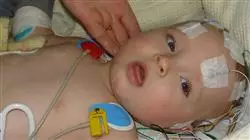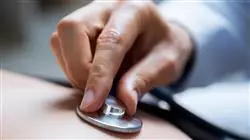University certificate
The world's largest faculty of medicine”
Introduction to the Program
The care of patients with infectious diseases is a challenge for all clinicians involved in it, and it is essential to maintain an updated level of knowledge that allows an adequate practice in a specialty that is constantly growing"

Emergency Department physicians face different challenges every day, with the care of patients with different pathologies. When a person with an infectious disease arrives at the emergency room, it is usually because their symptoms have reached an advanced stage or because the prescribed treatments have not been effective in combating the disease. Therefore, it is essential to know the main novelties in this type of pathology.
To train you in this field, TECH has proposed this training of the highest academic level specific to respiratory and cardiovascular infections. Thus, a program has been developed that includes the classic aspects in the management of infectious pathology by apparatus or organs, but also new items that are essential for the correct management of infectious diseases in the current scenario of globalization of health.
In addition, an important part of our training program is aimed at knowing the concept of risk prevention, derived from the care of infectious diseases, both for health personnel and the population, deepening in the measures that can be adopted in the emergency room to minimize them.
On the other hand, being a 100% online training, the professional will have the ability to decide when and from where to study, without commitments or obligations, thus being able to combine their study time with the rest of their daily obligations.
Increase your training in the treatment of people with respiratory and cardiovascular infections in a comfortable way and with all the guarantees of obtaining a quality and updated training"
This Postgraduate diploma in Respiratory and Cardiovascular Infections in the Emergency Room contains the most complete and up-to-date scientific program on the market. The most important features of the program are:
- The development of clinical cases presented by experts in respiratory and cardiovascular infections
- The graphic, schematic, and eminently practical contents with which they are created provide scientific and practical information on the disciplines that are essential for professional practice
- Therapeutic developments on intervention in respiratory and cardiovascular infections
- Practical exercises where the self-assessment process can be carried out to improve learning
- An algorithm-based interactive learning system for decision-making in the clinical situations presented throughout the course
- Special emphasis on research methodologies
- Theoretical lessons, questions to the expert, debate forums on controversial topics, and individual reflection assignments
- Content that is accessible from any fixed or portable device with an Internet connection
This Postgraduate diploma is the best investment you can make in the selection of an up-to-date program for two reasons: in addition to updating your knowledge in Respiratory and Cardiovascular Infections in the Emergency Room Infections, you will obtain a Postgraduate diploma from TECH Global University"
Its teaching staff includes a professionals from the field of medicine, who bring the experience of their work to this training, as well as recognised specialists from leading scientific societies.
The multimedia content, developed with the latest educational technology, will provide the professional with situated and contextual learning, i.e., a simulated environment that will provide an immersive training experience designed to train for real-life situations.
This program is designed around Problem Based Learning, whereby the physician must try to solve the different professional practice situations that arise during the academic year. For this purpose, the professional will be assisted by an innovative interactive video system developed by renowned experts in the field of respiratory and cardiovascular infections in the emergency department with extensive teaching experience.
Increase your decision-making confidence by updating your knowledge through this specialist course"

Take the opportunity to learn about the latest advances in emergency respiratory and cardiovascular infections and improve your patient care"
Why study at TECH?
TECH is the world’s largest online university. With an impressive catalog of more than 14,000 university programs available in 11 languages, it is positioned as a leader in employability, with a 99% job placement rate. In addition, it relies on an enormous faculty of more than 6,000 professors of the highest international renown.

Study at the world's largest online university and guarantee your professional success. The future starts at TECH”
The world’s best online university according to FORBES
The prestigious Forbes magazine, specialized in business and finance, has highlighted TECH as “the world's best online university” This is what they have recently stated in an article in their digital edition in which they echo the success story of this institution, “thanks to the academic offer it provides, the selection of its teaching staff, and an innovative learning method aimed at educating the professionals of the future”
A revolutionary study method, a cutting-edge faculty and a practical focus: the key to TECH's success.
The most complete study plans on the university scene
TECH offers the most complete study plans on the university scene, with syllabuses that cover fundamental concepts and, at the same time, the main scientific advances in their specific scientific areas. In addition, these programs are continuously being updated to guarantee students the academic vanguard and the most in-demand professional skills. In this way, the university's qualifications provide its graduates with a significant advantage to propel their careers to success.
TECH offers the most comprehensive and intensive study plans on the current university scene.
A world-class teaching staff
TECH's teaching staff is made up of more than 6,000 professors with the highest international recognition. Professors, researchers and top executives of multinational companies, including Isaiah Covington, performance coach of the Boston Celtics; Magda Romanska, principal investigator at Harvard MetaLAB; Ignacio Wistumba, chairman of the department of translational molecular pathology at MD Anderson Cancer Center; and D.W. Pine, creative director of TIME magazine, among others.
Internationally renowned experts, specialized in different branches of Health, Technology, Communication and Business, form part of the TECH faculty.
A unique learning method
TECH is the first university to use Relearning in all its programs. It is the best online learning methodology, accredited with international teaching quality certifications, provided by prestigious educational agencies. In addition, this disruptive educational model is complemented with the “Case Method”, thereby setting up a unique online teaching strategy. Innovative teaching resources are also implemented, including detailed videos, infographics and interactive summaries.
TECH combines Relearning and the Case Method in all its university programs to guarantee excellent theoretical and practical learning, studying whenever and wherever you want.
The world's largest online university
TECH is the world’s largest online university. We are the largest educational institution, with the best and widest online educational catalog, one hundred percent online and covering the vast majority of areas of knowledge. We offer a large selection of our own degrees and accredited online undergraduate and postgraduate degrees. In total, more than 14,000 university degrees, in eleven different languages, make us the largest educational largest in the world.
TECH has the world's most extensive catalog of academic and official programs, available in more than 11 languages.
Google Premier Partner
The American technology giant has awarded TECH the Google Google Premier Partner badge. This award, which is only available to 3% of the world's companies, highlights the efficient, flexible and tailored experience that this university provides to students. The recognition as a Google Premier Partner not only accredits the maximum rigor, performance and investment in TECH's digital infrastructures, but also places this university as one of the world's leading technology companies.
Google has positioned TECH in the top 3% of the world's most important technology companies by awarding it its Google Premier Partner badge.
The official online university of the NBA
TECH is the official online university of the NBA. Thanks to our agreement with the biggest league in basketball, we offer our students exclusive university programs, as well as a wide variety of educational resources focused on the business of the league and other areas of the sports industry. Each program is made up of a uniquely designed syllabus and features exceptional guest hosts: professionals with a distinguished sports background who will offer their expertise on the most relevant topics.
TECH has been selected by the NBA, the world's top basketball league, as its official online university.
The top-rated university by its students
Students have positioned TECH as the world's top-rated university on the main review websites, with a highest rating of 4.9 out of 5, obtained from more than 1,000 reviews. These results consolidate TECH as the benchmark university institution at an international level, reflecting the excellence and positive impact of its educational model.” reflecting the excellence and positive impact of its educational model.”
TECH is the world’s top-rated university by its students.
Leaders in employability
TECH has managed to become the leading university in employability. 99% of its students obtain jobs in the academic field they have studied, within one year of completing any of the university's programs. A similar number achieve immediate career enhancement. All this thanks to a study methodology that bases its effectiveness on the acquisition of practical skills, which are absolutely necessary for professional development.
99% of TECH graduates find a job within a year of completing their studies.
Postgraduate Diploma in Respiratory and Cardiovascular Infections in the Emergency Room
The attention of emergency physicians is produced in circumstances of maximum pressure, due to the fact that the symptoms of patients are usually more advanced and of greater severity. Therefore, the updating of these professionals must be a constant in their daily work, to achieve a more personalized care and with guarantees of success. To achieve this goal, at TECH we offer you this Postgraduate Diploma in Respiratory and Cardiovascular Infections in Emergency Medicine, of the highest academic level that will allow you to specialize in respiratory and cardiovascular infections. This specialization aims to provide a comprehensive understanding of respiratory and cardiovascular infections with emphasis on their diagnosis, treatment and management in the emergency setting. Participants will learn about the medical conditions that can affect the respiratory and cardiovascular systems, as well as the different forms of treatment and prevention of these diseases. The program will also cover the appropriate use of diagnostic technologies and the most current therapeutic techniques, including mechanical ventilation and the use of inotropes and circulatory assist devices. Students will also gain practical experience in the identification of symptoms and signs of disease, as well as in the management of emergency medical situations.
Why study at TECH Global University?
At TECH Global University we are accredited by Forbes as the best digital university in the world thanks to the 10,000 university degrees we have between our own, official, and undergraduate programs. In addition, our academic offer includes tools such as online library, multimedia content and specialized readings. In summary, the Postgraduate Diploma in Respiratory and Cardiovascular Infections in Emergency Medicine is an excellent option for health professionals seeking to expand their knowledge and skills in the diagnosis, treatment and management of respiratory and cardiovascular infections in emergency situations. This will seek to provide quality care to patients, while improving hospital management in conjunction with these medical and healthcare personnel.







